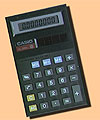| Problems and troubles | ||
 |
||||||
|
A Writer from Cameroon in West Africa writes: I'm
having difficulty distinguishing between problems and troubles.
Can you please explain to me how to use both terms correctly? |
| |
||
| Roger Woodham replies: | ||
Problem Problem is a countable noun and describes something that causes trouble or difficulty. We talk about having a problem or having problems with something, not about having a trouble. Compare the following:
We also talk about mathematical problems and solving problems of various sorts. Trouble cannot be used in this way:
With the verb cause, we can use both trouble and problems, problem as a countable noun and trouble as an uncountable noun. Compare the following:
|
||||
|
We also have the expressions No problem! which we use to say that we will be happy to do something or are happy for something to happen and What's your problem? which we use in a threatening way to ask someone about something we disapprove of. Compare the following:
|
|
Trouble is mainly used as an uncountable noun and describes problems, worries or difficulties. Trouble can also be used as a verb. Compare the following:
In addition to cause, the verbs that the noun trouble collocate with include the following: put to, take, go to, save, get into, run into, and be in. These verbs cannot be used with problem in the same way. Compare the following:
No trouble! Note that the expression No trouble! is used in a similar way to No problem!
problem / trouble + adjs Note from the examples above that the adjectives big, real and serious collocate with both trouble and problems. Note that fundamental, insoluble and intractable collocate only with problem:
|
||||
|
If you would like more practice more please visit our in the You, Me and Us part of our website. |
||||